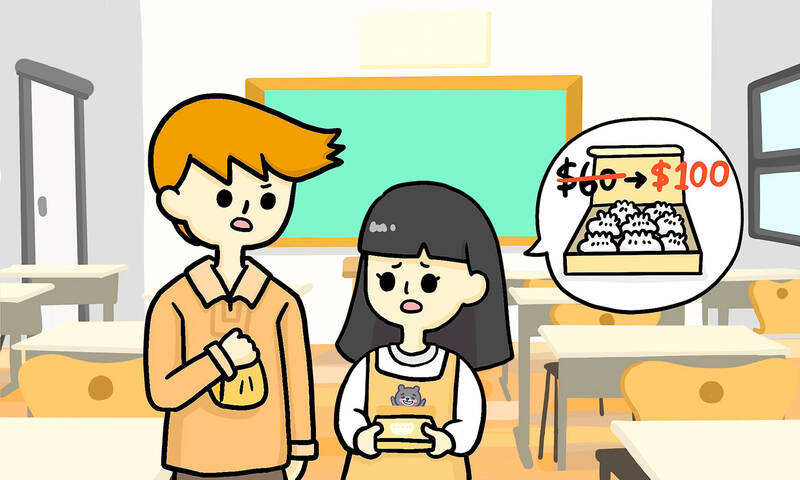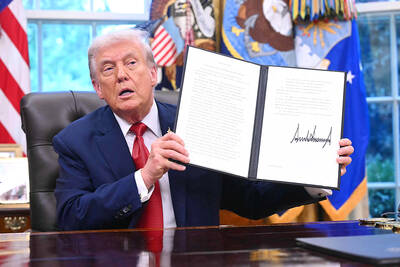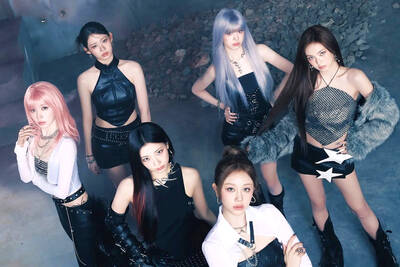對話 Dialogue
小實:我中午買了這盒水餃,才八顆就要一百塊!
Xiǎoshí: Wǒ zhōngwǔ mǎile zhèi hé shuǐjiǎo, cái bā kē jiù yào yìbǎi kuài!

馬克:我最喜歡的漢堡店下個月也要調漲價格了。
Mǎkè: Wǒ zuì xǐhuān de hànbǎo diàn xià ge yuè yě yào tiáozhǎng jiàgé le.
小實:汽油的價格也要調漲了!怎麼會這樣?
Xiǎoshí: Qìyóu de jiàgé yě yào tiáozhǎng le! Zěnme huì zhèyàng?
馬克:我覺得這是全球的經濟問題。
Mǎkè: Wǒ juéde zhè shì quánqiú de jīngjì wèntí.
小實:就是新聞常說的「通貨膨脹」吧!
Xiǎoshí: Jiùshì xīnwén cháng shuō de “tōnghuò péngzhàng” ba!
馬克:嗯!有疫情和戰爭的話,都會影響經濟。。
Mǎkè: Ēn! Yǒu yìqíng hàn zhànzhēng dehuà, dōuhuì yǐngxiǎng jīngjì
小實:幸好明年的基本工資也調漲了。
Xiǎoshí: Xìnghǎo míngnián de jīběn gōngzī yě tiáozhǎng le.
馬克:嗯,我們都要好好存錢和投資。
Mǎkè: Ēn, wǒmen dōu yào hǎohǎo cúnqián hàn tóuzī.
翻譯 Translation
Xiaoshi: I bought this box of dumplings for lunch. It cost 100 dollars for only eight dumplings!
Mark: My favorite burger joint is also raising prices next month.
Xiaoshi: The price of gasoline is going to rise, too! How come?
Mark: I think this is a global economic issue.
Xiaoshi: It’s the inflation that the news often talks about!
Mark: Yeah! If there is an epidemic or war, it will affect prices.
Xiaoshi: Luckily, the basic salary will also be increased next year.
Mark: Well, we all need to save and invest wisely.
單字片語 Vocabulary
1. 調漲(tiáozhǎng) to raise, to increase
2. 價格 (jiàgé) price
3. 汽油 (qìyóu) gasoline
4. 經濟 (jīngjì) economy
5. 通貨膨脹 (tōnghuò péngzhàng) inflation
6. 疫情(yìqíng) epidemic
7. 戰爭(zhànzhēng) war
8. 幸好(xìnghǎo) fortunately
9. 基本工資(jīběn gōngzī) basic wage, basic salary
10. 投資(tóuzī) to invest
教材音檔 Audio Files
教材影片 Video Files:
https://www.instagram.com/celc.nou_tw/guide/_/17999106352646292/
實踐大學華語中心提供
By Shih Chien University Chinese Language Center: https://chineseusc.com/

The content recommendation algorithm that powers the online short video platform TikTok has once again come under the spotlight after the app’s Chinese owner ByteDance signed binding agreements to form a joint venture that will hand control of operations of TikTok’s US app to American and global investors, including cloud computing company Oracle. Here is what we know so far about its fate, following the establishment of the joint venture. IS BYTEDANCE CEDING CONTROL? While the creation of this new entity marks a big step toward avoiding a US ban, as well as easing trade and tech-related tensions between Washington and Beijing, there

A: Happy New Year! I can’t believe it’s 2026 already. Where did you count down? B: I went to pop singer A-mei’s Taitung concert yesterday for the New Year’s countdown. How about you? A: I went to rock band Mayday’s Taichung concert yesterday. Going to their New Year’s shows has become a holiday tradition for me. B: Don’t forget, we’re also going to Jolin Tsai’s show tonight. It’s her first perfomance at the Taipei Dome. A: Yeah, that’s right. It’s great to start the year with good friends and good music. A: 新年快樂!我真不敢相信都已經2026年了。你昨天去哪跨年啦? B: 我昨天去了流行天后張惠妹的台東演唱會,還和她一起跨年倒數。那你呢? A:

Prompted by military threats from Russia, Denmark has recently passed a new conscription law, officially including women in its military draft for the first time. From July 1, 2025, Danish women, upon turning 18, will be entered into the draft lottery. If selected, they are to serve in the military for 11 months, just as men do. Not only has this decision attracted international attention, but it has also sparked discussions on gender, equality and national defense. Although Denmark’s reform appears to promote gender equality, it primarily responds to regional instability and the need to strengthen national defense. With

A: Apart from Taiwan’s A-mei, Mayday and Jolin Tsai, there are many foreign singers coming to Taiwan early this year. B: The South Korean girl group Babymonster are playing two shows at Taipei Arena starting from tonight. Who else is coming to Taiwan? A: Other artists include Australian band Air Supply, K-pop superstar Rain, boy group Super Junior, TXT, US singers Giveon and Josh Groban, and Irish boy group Westlife. B: Air Supply was the first foreign band to come to Taiwan in 1983, and they’re probably the most frequently visiting group too. A: As the year is beginning